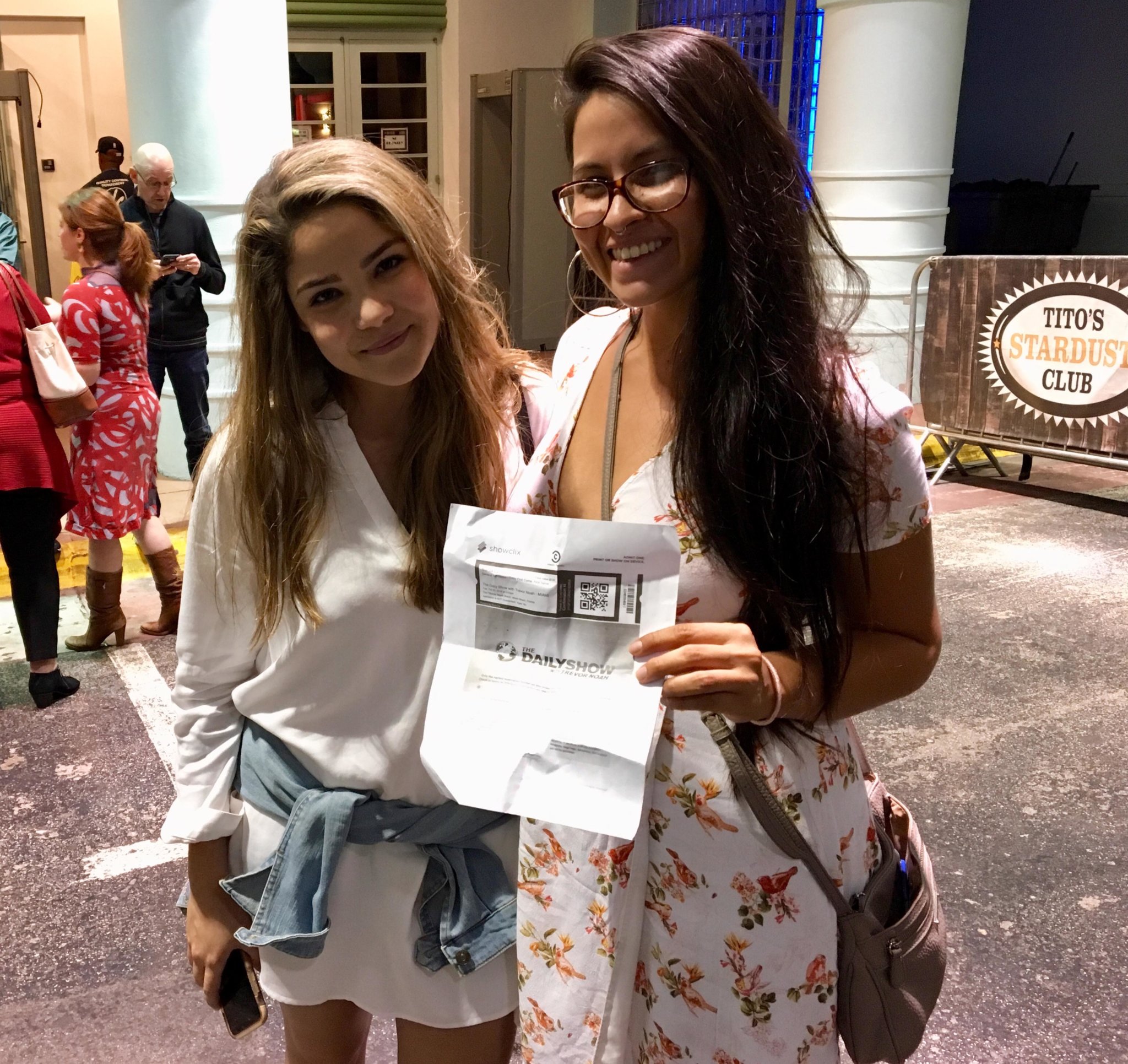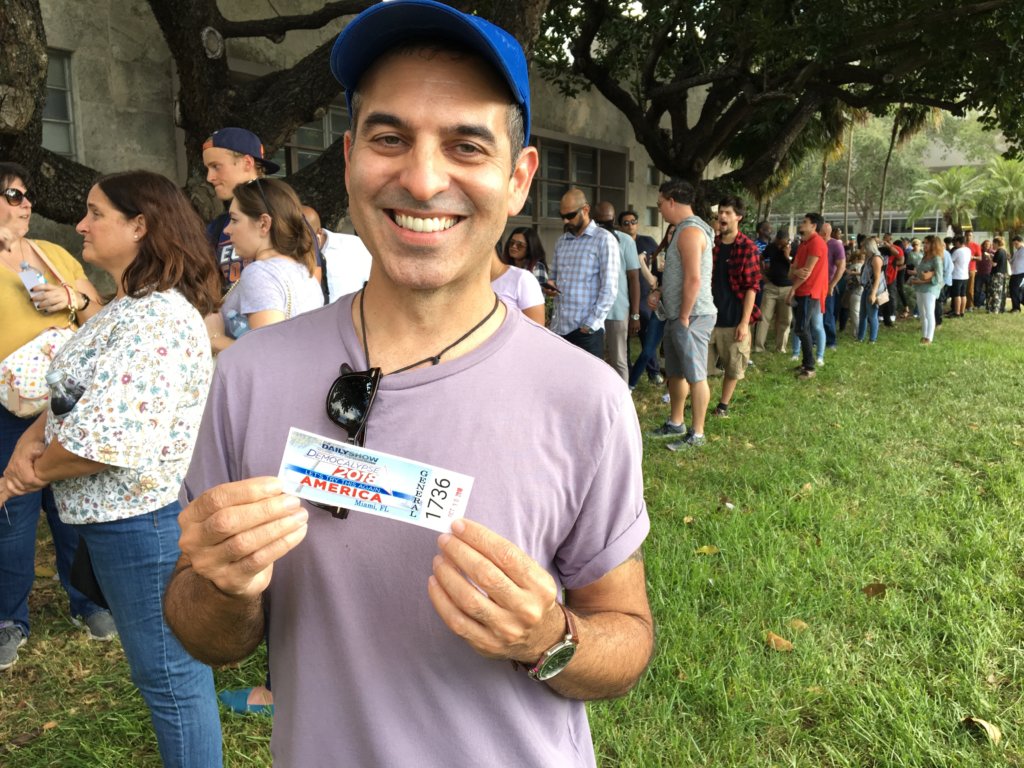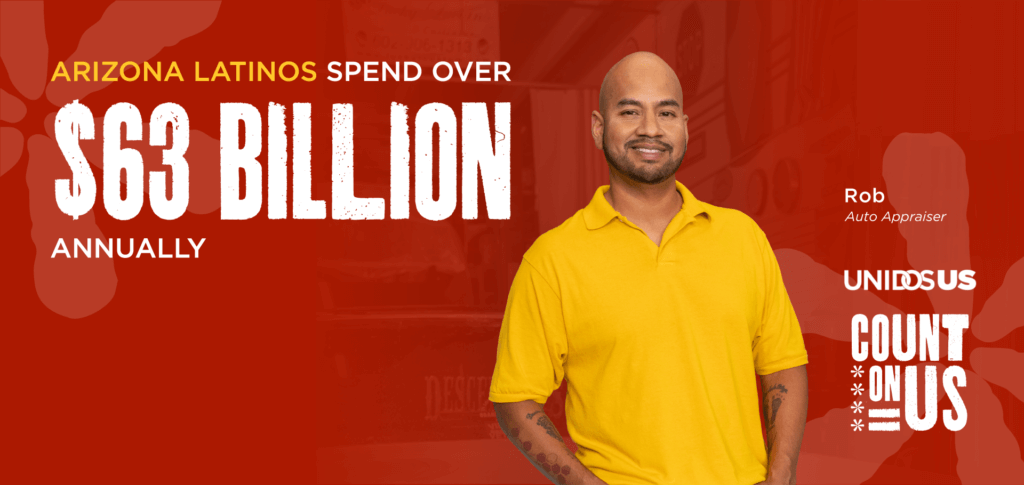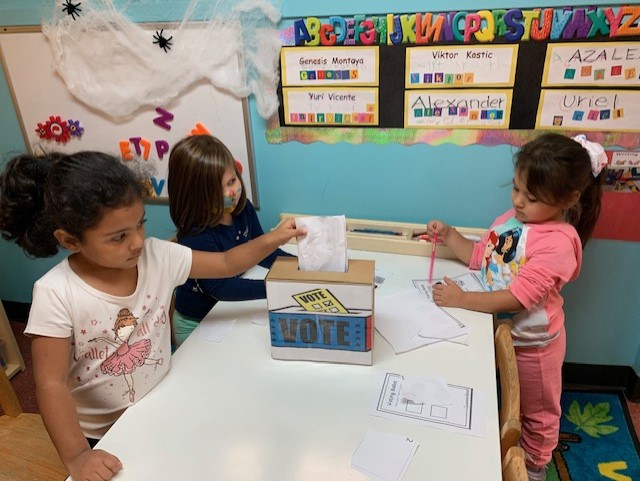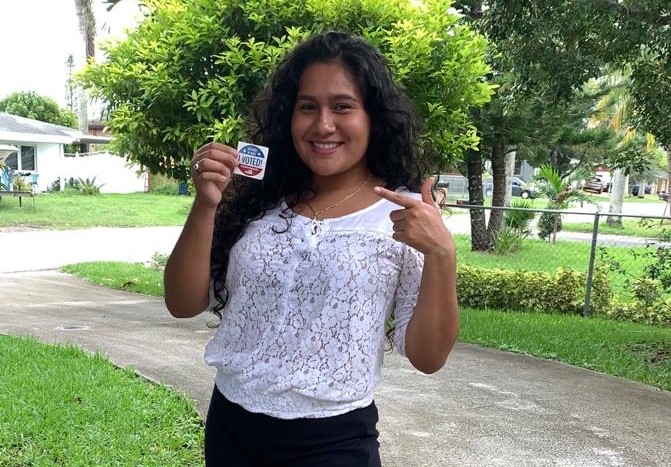During a visit to Miami, The Daily Show’s Trevor Noah tells Floridians to vote with empathy for immigrants
They came from the voting station across the street at the Miami Beach City Hall and they came from the far reaches of Miami-Dade County’s Everglades—all races, all ages, all sexual orientations, and all types of immigration statuses—waiting nearly three hours in the hot South Florida sun to be ushered into the Filmore Theater for an up-close-and-personal laugh with the comedic news host Trevor Noah from Comedy Central’s The Daily Show.
Noah was armed with good humor, social concern, and a strong message of civic engagement, especially for the area’s many Hispanics: “Go vote.”
“I have a hard time watching or listening to news these days. It’s so disheartening,” said registered voter Jorge Gonzalez Graupera from the line outside the auditorium. Born in Cuba in 1972, he came to the US during the 1980 Mariel Boatlift, when some 125,000 Cubans boated across the Strait of Florida to Miami and won asylum.
Keep up with the latest from UnidosUS
Sign up for the weekly UnidosUS Action Network newsletter delivered every Thursday.
“I’m hoping Noah can bring attention in some way to people who are on the fence about voting—because there’s a lot of that, especially among young people,” Graupera added. “I think comedy’s a great tonic. It’s a great way to contextualize politics.”
That’s exactly what Noah had in mind when he launched this week’s series of shows in the Sunshine State under the banner Democolypse 2018.
“In my opinion, Florida is a microcosm of everything America faces—the environment, campaign finance, immigration,” Noah told the audience as his crew rearranges the set behind him. “It’s like reliving a piece of 2016.”
On Tuesday, the renowned comedian and South African immigrant chose to focus on the topic of immigration.
“Just like you, Donald Trump knows that the midterms are seven days away, and so to motivate his voters, he’s doing something really special. Well, it’s the thing that he does best. He’s scaring the shit out of his voters, alright? Specifically by using brown people. It’s sort of like Halloween, but a racist Halloween,” said Noah, turning to a video screen depicting media coverage of the so-called caravan of Central American migrants walking through Mexico on their way to the U.S. border to seek asylum.
“The caravan is basically a group of a few thousand people who are walking to the United States from crime-ridden and impoverished countries like Honduras and Guatemala, and they’re walking to the U.S. partly in protest and partly to apply for asylum and a better life. And it’s a tough journey. They’ve got no food, they’ve got water, there’s no way to bathe—it’s basically like Burning Man except the people aren’t pretending to be poor,” Noah said as many in the crowd let out an uneasy laugh. “It’s a group of people who are saying to America, ‘hey we’re in trouble, can you help us?’”
Common sense caravan solutions. Full piece: https://t.co/XjDMAfgC5x pic.twitter.com/yOVN4HxoeF
— The Daily Show (@TheDailyShow) October 31, 2018
Noah then returns to the video screen with news clips of Trump responding to the caravan by sending 5,200 U.S. troops to Mexico border, outnumbering the 4,000 migrants in the caravan. Reporters say those troops are equal to the number of U.S. soldiers fighting the terrorist group ISIS in Iraq.
Noah joked that troops will be engaging in one-on-one defense as they try to capture the abuelas, or grandmothers, slipping past them or under their legs.
“These immigrants aren’t illegal anything, right? They’re planning to apply for asylum once they get to the U.S. border, right? It’s not like they’re just going to rush across the U.S. border like a giant game of Red Rover,” he says.
“This is ridiculous. Instead of sending 5,000 troops to the border, why not send 5,000 judges and lawyers to help with the asylum process?”
Immigrants are risking everything to make the long and often dangerous journey here to request asylum. They will need help and guidance understanding the asylum-seeking process—something the military will not be able to provide. https://t.co/vr2W4Al4bS
— UnidosUS (@WeAreUnidosUS) October 29, 2018
Tuesday’s featured guest, baseball legend and co-owner of the Miami Marlins Derek Jeter, shared visions of a more inclusive America. He told Noah that celebrity athletes can be model citizens on and off the field by standing up for their beliefs, engaging the community through educational outreach, and by adapting to the great American melting pot. With nearly one-third of all Major League Baseball players born outside of the United States, usually in Latin America, Jeter requires that the entire Marlins team learn Spanish, himself included.
“When you have Hispanic players coming to the U.S. everyone automatically assumes they speak English and that’s not always the case, and I don’t necessarily think that’s fair,” Jeter said.
Young Latinx who spoke with UnidosUS before and after the taping said they appreciated The Daily Show’s efforts at putting the spotlight on Florida.
“I think Noah did a really good job of hitting all the major points that us as Floridians or young millennials want to talk about—the environment, the immigration policy. Coming from immigrant parents, this is really important to me—other people might be in the shoes that I was in,” said Brenda Castellon, a 26-year-old Miamian who has roots in Peru, Argentina, Bolivia, and Spain.
She said this election is so contentious that she was inspired to ask her family, including her brothers, who are first-time voters, to go to the polls together.
“We have to realize that now more than ever, we are the voice, we need to make ourselves heard, for our parents, for our future kids, for anyone who maybe looks like us.”
That concept takes on a lot of interesting nuances in a state with such a diverse Latin American and Caribbean population. For years, a large percentage of Cuban Americans voted Republican. But South Florida’s demographics in and outside of the Cuban community have changed dramatically over the past two decades.
The exiles have had children and grandchildren who don’t always share the same worldview. A wider, more diverse pool of Cubans have continued to emigrate, and the area’s larger immigrant population has grown to include hundreds of thousands of South and Central Americans, many of them fleeing weak economies, political corruption, and increased levels of violence back home.
Then in 2017, the Obama administration ended the so-called “wet foot, dry foot” policy which allowed Cubans who touch American soil to stay no matter how they enter the country, putting many Cubans in the same situation as other undocumented people.
Mig Escobar, 25, represents the younger and later generation of Cuban American voters. She emigrated from the island when she was five years old and has watched the political landscape in Miami and around the nation shift throughout the span of her life.
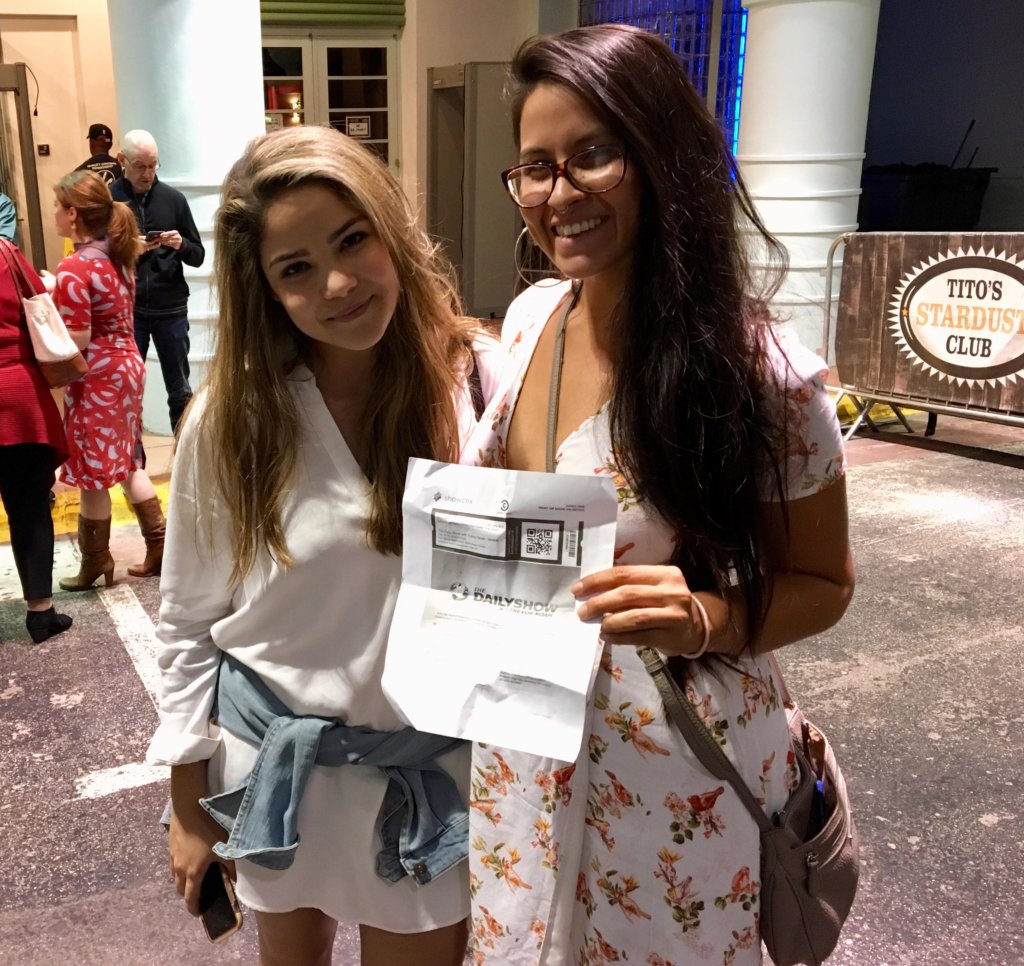
“I voted. It felt great, although it was a little nerve-wracking just because this was such an important election for my generation, for a lot of people who didn’t feel like their voice was heard in the last election. Now we’re all anxious about the results of this upcoming one,” she said as she exited the auditorium. “Trevor Noah is doing a great job and I do think it’ll make a difference at least in terms of the youth vote, in terms of getting out there and doing your research, not just blindly voting.”
Graupera agreed. “It’s a long ballot and I’ve got a lot of work on my plate,” said the videographer, whose company Jorge Graupera Films focuses on educational and civic engagement production. But he said he will find the time to study and vote on every question.
“Why is it important to hit the rest of the ballot? Because we can often affect more change on a local level,” he added.
Apart from the topics of immigration, the environment, and health care, Graupera said he is also concerned about the state of Florida’s public education.
“It’s supposed to be an equalizer but it’s being eroded,” he said, referring to the way education policies can mask the needs of underserved students, such as those who are often low-income, children of color, English learners, and students with disabilities. “Education shouldn’t collect into small pools and become so exclusive.”
Graupera said he was already planning to vote before going to the Daily Show taping, but he is excited to see that Noah’s efforts to educate the crowd about Florida’s most pressing political issues got them fired up and ready to make reflective choices at the polls.
“That’s my assignment. When I get home I’m going to fill out my absentee ballot and send it.”
Julienne Gage is the senior web content manager for UnidosUS’s education blog ProgressReport.co. She is based in Miami, FL.
Join us and @StateFarm in celebrating some of the biggest Latinx artists and their impact on American culture. Tune in November 4 at 5pm EST/8pm PST. #ALMAs pic.twitter.com/RUcEU8Zplf
— Fuse (@fusetv) October 29, 2018
